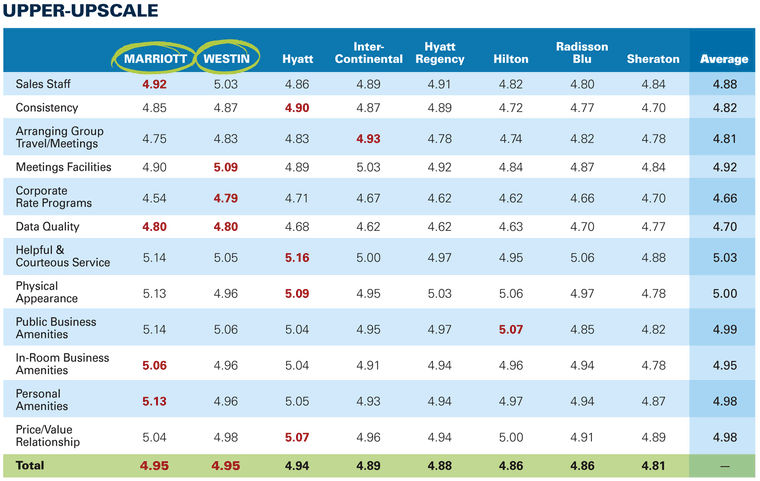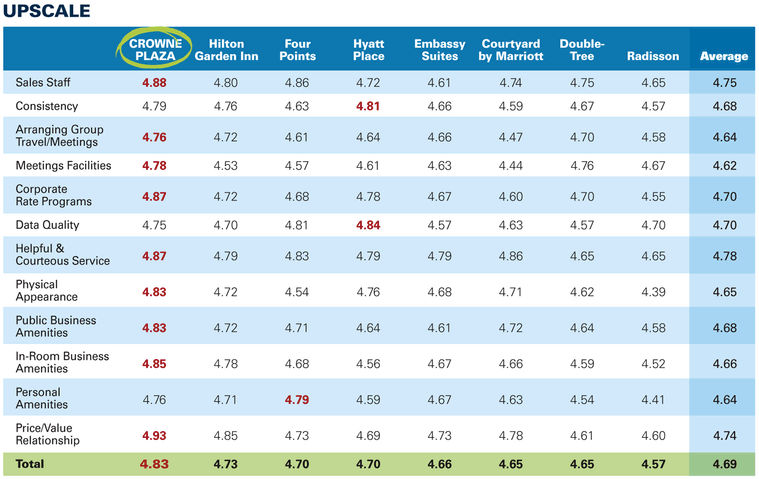The upper-upscale segment proved to be the most competitive
tier in this year's survey. Starwood Hotels & Resorts' Westin brand tied
for first place with future bedfellow Marriott Hotels, while Hyatt Hotels Corp.'s
flagship Hyatt brand finished just 0.01 points behind to snag third. Still, the
top scores for each criteria were spread across several brands beyond the top
three.

In the upscale tier, InterContinental Hotels Group's Crowne
Plaza Hotels & Resorts brand moved from eighth place last year to first
place this year, securing the highest scores in nine of the 12 criteria. Second
place Hilton Garden Inn also moved up significantly, jumping from last year's
sixth place. The upper-upscale and upscale tiers showed the largest
year-over-year increases in scores, as the lowest-scoring brand in each tier in
2016 nearly matched or bested the top scores from 2015.
Bjorn Hanson, a clinical professor at the New York
University School of Professional Studies Tisch Center for Hospitality and
Tourism, suggested the rise from last year could be the result of a record
amount of spending by the U.S. lodging industry on capital expenditures in
2015, particularly within the upper-upscale and upscale segments. According to
Hanson, spending in the upper-upscale space focused on items that had been
deferred from 2009 to 2014 and on property upgrades to meet brand standards and
keep up with competition from the upscale and upper-midprice tiers. Spending in
the upscale segment, meanwhile, contributed to noticeable changes in lobby
spaces, fitness centers, breakfast areas and high-speed Internet capacity.
Westin, which also placed first last year, shifted its brand
identity from renewal to wellness, moving from soft pastels to bold colors and
active imagery on its room keys, menus and marketing materials. It earned the
highest scores for meetings facilities, corporate rate programs and data
quality.
As part of its meetings initiatives, Westin enhanced its
Tangent workspace offering, now available at almost 60 locations globally.
Tangent features videoconferencing and Steelcase's Media:scape furniture and
technology setups. Brian Povinelli, Starwood senior vice president and global
brand leader for Westin and Le Meridien, said Phase 2 will bring Bluetooth
connectivity.
Building on its running concierge program for groups and
meetings guests, Westin introduced "sweat-working" happy hour runs in
June. It also added other fitness concierges, such as the surfing concierge at
The Westin Los Angeles Airport and the hiking concierge at The Westin Bear
Mountain Golf Resort & Spa, Victoria in British Columbia. "We're
introducing more experiential opportunities for our group business that not
only reinforce our positioning as a brand in the wellness space but really get
to what we're hearing meeting planners and corporate accounts are looking for,"
Povinelli said.
Marriott, which took the No. 1 spot in BTN's 2014
survey and third place in last year's, garnered the highest scores for sales
staff, data quality and in-room amenities, both business and personal. This
past year, the brand focused on appealing to modern travelers, both through its
guest room update program, Marriott Modern, and through app enhancements like
digital check-in, service chat and alerts that notify guests when their rooms
are ready.
"Making sure that a holistic full-service hotel
experience is being delivered to our guests in a very compelling, exciting and
modern way is a huge focus for the brand," said Matthew Carroll, vice
president and global brand manager for Marriott Hotels. The Marriott Modern
renovations introduce updates to the guest rooms like hardwood floors and
multipurpose work surfaces. The brand has also focused on enhancing its food
and beverage offerings and modernizing public spaces.
Year-to-date average daily rate for the upper-upscale
segment as of the end of July increased 2.3 percent year over year to $179.62,
while occupancy dipped 0.3 percent, according to STR. Though pure upper-upscale
occupancy was high at 75.5 percent, supply growth for the segment, 1.5 percent,
overtook demand growth, 1.2 percent, which means occupancy could continue to
drop off in the months or years ahead.
Upscale
"Business travel is changing, and we're evolving the
brand, the products, the services that we offer to meet those changing needs,"
said Eric Lent, vice president of the Americas for Holiday Inn and Crowne
Plaza. The brand shifted its focus to connectivity, productivity
and wellness for its guests in 2015. IHG Connect, for example, enables a single
Internet sign-on process that follows guests from property to property. The
brand also multiplied bandwidth. In-room, the brand enhanced device-charging
capabilities and introduced a wellness dining menu. It also has increased the
sales staff that's devoted to corporate sales in order to be more responsive to
requests for proposals. In June, IHG announced it would invest $200 million in
Crowne Plaza in the Americas to further appeal to business travelers.

Upscale's No. 2, Hilton Garden Inn, too, is enhancing its
product for business travelers, which are 70 percent of its guests, according
to senior vice president and global brand head of Hilton Garden Inn John
Greenleaf.
"Hilton Garden Inn feels like a full-service hotel,"
Hanson said of the brand. "There's a restaurant, [so] there's a place to go
that isn't just hanging out in a lobby."
The brand has capitalized on Hilton Worldwide's digital
initiatives, including loyalty member discounts, free Wi-FI and digital check-in
and room selection. Hilton Garden Inn also will push out a prototype for the
Garden Market with expanded food and beverage options. Additionally, the brand
is enjoying a healthy level of growth, having just opened its 700th hotel and
boasting a pipeline of more than 250 signed deals.
The upscale segment has seen a boom in supply in
recent years. As of July, it accounted for the largest share of U.S. hotel
rooms under construction, 34.7 percent, according to STR, and supply growth
outpaced demand growth for the first half of the year.